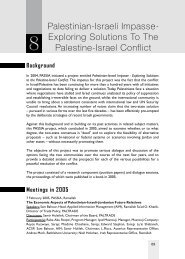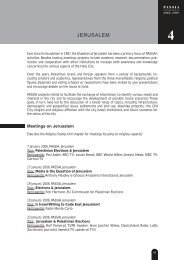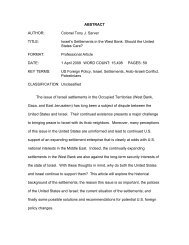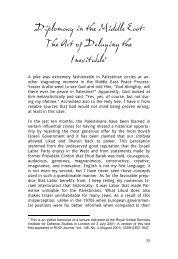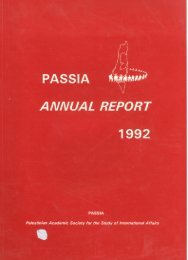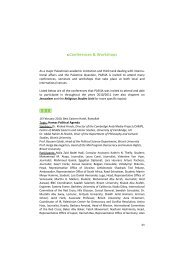FINLAND & PALESTINE Proceedings of a Joint Workshop
FINLAND & PALESTINE Proceedings of a Joint Workshop
FINLAND & PALESTINE Proceedings of a Joint Workshop
You also want an ePaper? Increase the reach of your titles
YUMPU automatically turns print PDFs into web optimized ePapers that Google loves.
ual activists <strong>of</strong>ten criticize the church harshly for not fully accepting<br />
homosexual couples.<br />
Finland is <strong>of</strong>ten presented as a model country <strong>of</strong> gender equality.<br />
Some religious Finns think that it is because Finland is a<br />
Lutheran majority country. My own opinion is that Finland has<br />
achieved a great deal in the field <strong>of</strong> gender equality, but it is<br />
not because <strong>of</strong> any religious affiliation. I am convinced that the<br />
more secular a society is, the more chance it has to create a<br />
situation <strong>of</strong> equal rights, not only for women, but for all minorities<br />
as well.<br />
Feminism in Finland, nowadays, is a complex phenomenon.<br />
There are feminist groups who object to the so-called state<br />
feminism <strong>of</strong> the country. State feminism means the assimilation<br />
<strong>of</strong> feminist efforts and inclinations into the general politics<br />
<strong>of</strong> the state, and the way in which women's movements act in<br />
co-operation with the state, working from inside the state<br />
structures, and aiming to change the society from the inside.<br />
This kind <strong>of</strong> state feminism is not unknown in the Middle East<br />
either; the way Syrian secular feminist movements have<br />
worked for several decades is very close to this model.<br />
Some groups think that Finnish state feminism consolidates the<br />
existing power relations between the genders and, in fact, only<br />
re-assert the present situation. There are new trends in feminism<br />
in Finland, as in many other Western countries. We speak<br />
about post-feminism, which refers to feminists who consider<br />
simply that "women are people". Thus, views that separate the<br />
sexes rather than unite them are considered sexist, rather than<br />
feminist.<br />
We speak about postcolonial feminism, which argues that oppression<br />
relating to the colonial experience, particularly racial,<br />
class, and ethnic oppression, has marginalized women in post<br />
118



